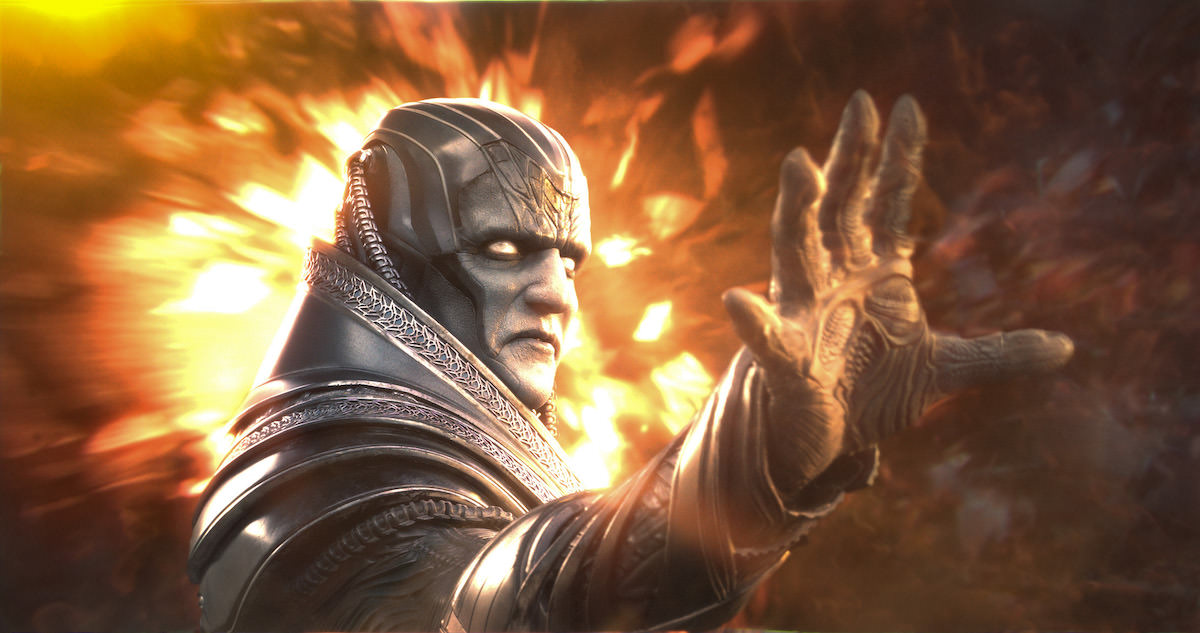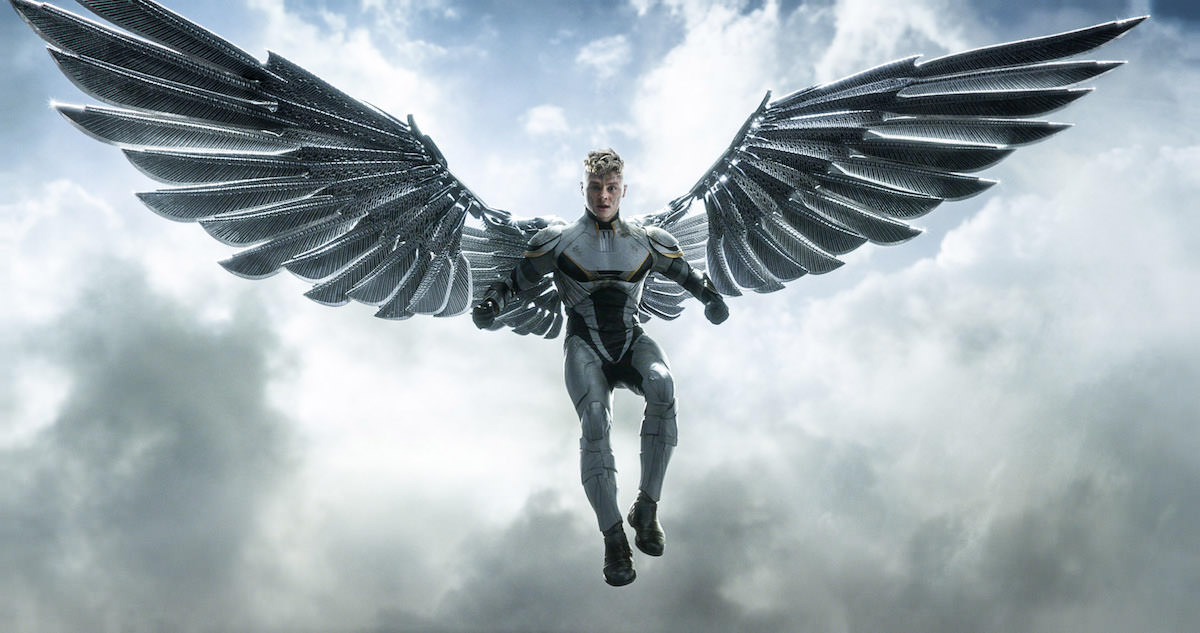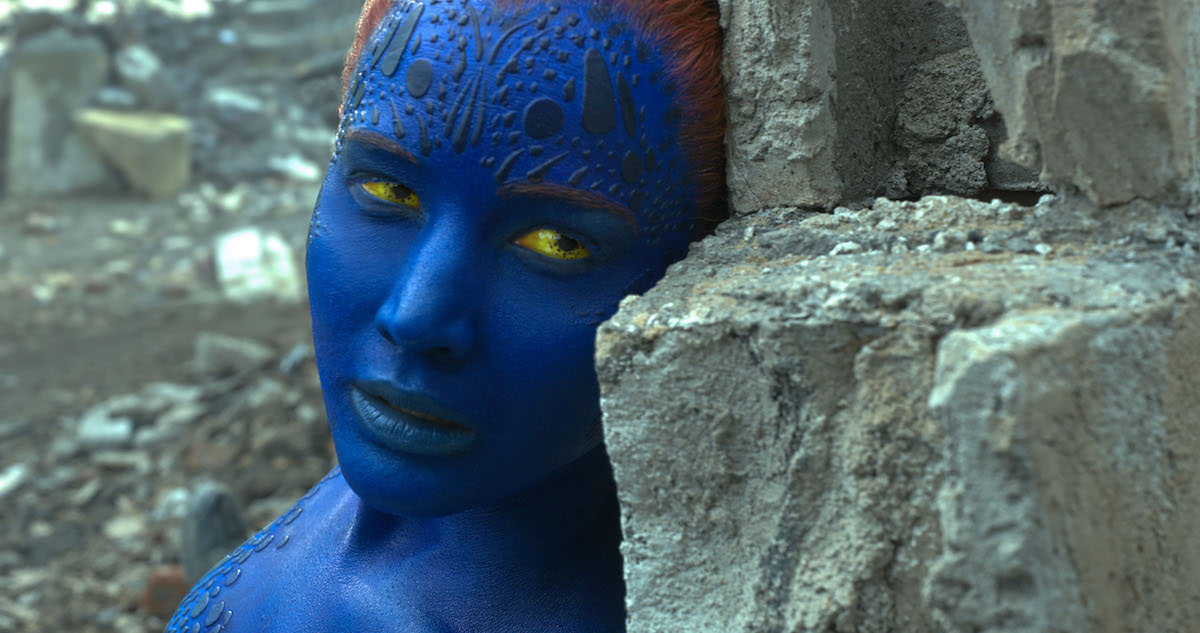X-Men: Apocalypse Spoiler-Free Review
Let's talk about X-Men: Apocalypse. We'll do this without any major spoilers. A few minor reveals might seep in here and there, but nothing that's going to really surprise anyone who's been paying attention to run-up to Bryan Singer's latest installment.
Let's begin with your title villain.

Oscar Isaac is Apocalypse. Courtesy Twentieth Century Fox.
Much has been made about the wisdom of slathering beloved Oscar Isaac in enough prosthetics, makeup and costuming to make him all but unrecognizable. Yes, it's indeed difficult to see Isaac at all in the figure of Apocalypse. What's more, it's hard to hear Isaac, as there's a lot of voice work with his character—often, his dialogue (which is often spoken like the rough draft of the ten commandments written when God was in a really bad mood) is layered with sound effects, so his voice is often doubled to give him more of that God-like gravitas. So no, you're not getting the fresh faced Isaac of The Force Awakens, the bearded Isaac or Ex Machina, the frumpled Isaac of Inside Llewyn Davis or the suave Isaac of A Most Violent Year—but why would you? He's playing the o.g. mutant in a huge Marvel franchise. Outside of Tom Hiddleston's Loki, a lot of the super bad guys in these Marvel movies are hidden beneath gobs of make-up and prosthetics and costume. Think of Josh Brolin's Thanos (only his jaw is Brolin-esque) we see briefly in the Avenger films, or Lee Pace's Ronan the Accuser in Guardians of the Galaxy—these are great actors rendered all but unrecognizable in the name of lunatic villainy.
Okay enough about how he looks, the question should be; is he compelling? The film opens with a pretty spectacular set piece in ancient Egypt, where we see our only glimpse of an unadorned Isaac (for a second you might go, wait, what's Poe Dameron doing in ancient Egypt?) becoming Apocalypse, and the whole sequence is a pretty brisk piece of business, with a Temple of Doom meets Exodus: Gods and Kings feel to it. When Apocalypse returns, his first few minutes of screen time are some of his best. Casually walking around Egypt in 1983, appalled at what he sees and possessing monstrous power, Apocalypse is undoubtedly compelling when he turns would-be tough guys into wall ornaments (you'll get this when you see it). The scene where he meets a young Storm (Alexandra Shipp) is pretty great. It makes you imagine a movie in which Apocalypse spent more time terrifying people face-to-face, rather than plotting world domination from afar.
Storm is Apocalypse's first recruit. By now you know that the film revolves around the conceit of Apocalypse gathering his four horsemen and "cleansing" the world so that he can start it afresh, with him at the top of the pyramid, so to speak. What the film reminded me was that X-Men is at its best when we see mutants trying to get by in (or rebelling against) human society. We only get a brief glimpse of Storm's pre-Apocalypse life as a leader of a band of child thieves in Egypt. It would have been interesting to see more of her pre-Apocalypse life, as she's quickly swept up in the old Egyptian's power craze.
There are a number of truly affecting scenes in the early going. One was glimpsed in this clip involving a cage match in Berlin between Angel (Ben Hardy) and Nightcrawler (Kodi Smit-McPhee) that was a direct callback to Wolverine's cage match scene in the very first X-Men. This is X-Men at its most potent—mutants at the mercy of mankind's capriciousness and fear. When Mystique (Jennifer Lawrence) arrives to save them (she only gets to Nightcrawler—Angel will be recruited by Apocalypse) you want her and Nightcrawler to stick around and kick some human ass rather than flee.
The next mutant on Apocalypse's recruitment tour is Olivia Munn's Psylocke, whose powers include generating a "psychic knife" to stun or kill opponents (I had to look that up). Munn is clearly having fun in the role, you just wish Psylocke had more to do in this film. In fact, what's surprising about Apocalypse is Magneto's the only horseman Apocalypse seems to truly need, with one major exception (which I won't spoil), and that leaves Storm, Angel and Psylocke with less to do than you'd expect, considering how much of the marketing material has revolved around them. It's a quibble, but there it is.

Angel’s (Ben Hardy) mutation gave him large wings and the ability to fly. Angel’s agility, strength and reflexes make him a lethal hand-to-hand combatant. Courtesy 20th Century Fox.
Speaking of Angel, his recruitment scene is brief but a hoot (whereas Magneto's is grim and intriguing)—after being freed from the cage match, he goes on a bender, listening to death metal and drinking vodka in an abandoned church in Berlin. This is where Apocalypse, Storm and Psylocke find him, flying around the rafters, wasted, music blaring. Crazy teenage mutants! Angel's metamorphosis from run-of-the-mill flying mutant into one of the horsemen is also the most painful. Apocalypse gives each of his horsemen increased powers, but for Angel, this means losing his feathers (and his ribs) in favor of metal versions in the most violent molting ever. It's a little moment of body horror that feels like David Cronenberg walked on set to direct this scene.
Singer gives us a few of the classic X-Men setups in which mutants are trying and failing to get by in society. In introducing Scott Summers (Tye Sheridan), who's a big part of this film, we see him being bullied in high school. The bully's timing is comically bad, however, as we showed you in this clip. Scott is just discovering that he can shoot hugely powerful beams from his eyes when his tormentor comes pounding on the bathroom door he's hiding in, threatening him.
As has been the case in past X-Men films, the most intriguing mutant here is Erik Lehnsherr, better known as Magneto (Michael Fassbender), and his early scenes in Apocalypse are the best in the whole film. It would be against our spoiler-free premise to say anything more, other than what happens in the woods in Poland outside Erik Lehnsherr's house is X-Men mythologizing at its very best. You already know Magneto becomes one of Apocalypse's four horsemen (and easily the most powerful), and this scene is what motivates him. He was trying to live as Henryk, a humble Polish metalworker, after the events in Days of Future Past left Magneto a wanted man, but society just won't leave Magneto alone. It also speaks to the argument between Charlies Xavier and Magneto that's been rippling through every X-Men film—Xavier believes humans can learn to accept mutants, while Magneto has learned, first hand, how humans will take everything a mutant cares about every chance they get.

Mystique (Jennifer Lawrence) pauses during an epic, earth-shattering battle with Apocalypse. Courtesy 20th Century Fox.
As for your good guys, along with Xavier (James McAvoy), Scott/Cyclops, Nightcrawler and Mystique/Raven, your fan favorite from X-Men: Days of Future Past is back, and he's as great as ever. Of course I'm talking about Quicksilver (Evan Peters) who makes the film's best entrance in one of the best scenes. Again, I won't spoil what happens here, only to say if you enjoyed his famous "Time in a Bottle" sequence from Days of Future Past, you'll enjoy this.
Once Apocalypse has his horsemen and the fight for humanity begins, the film moves inexorably towards the climatic final clash between the forces of good and evil, as we've seen so many times before. If this final battle is less captivating than, say, Captain America: Civil War's final battle(s), it's perhaps a problem of scale; we've seen fights where the fate of the entire planet is at stake in film after film, so the more intimate brawl in Civil War ends up, paradoxically, feeling more important. That's not to say there aren't real delights to be had in Apocalypse—there are. I haven't even mentioned the escape from Colonel Stryker's compound that required the help of a certain someone (come on, you know who), or the many, many graceful touches that Singer blends into the action to give it meaning and nuance. These moments are there, and every time the audience in the advanced screening I attended burst into applause, it was to cheer one of these callbacks.
In fact, the best part of Apocalypse isn't the battle for mankind, but rather the battle for Magneto's soul. His origin story (his parents were killed in the Holocaust) was already painful enough, but in Apocalypse he's given even more grief to bear, and it's his rage, not the title villain's, that is the most compelling. In the end, the true battle in the latest installment of the X-Men franchise is the same as it's always been, and the one that's meant the most to fans—the battle between hope, represented by Professor X, and revenge, in the form of Magneto. In this way, nearly all of the films in the franchise could be titled X-Men: Civil War.
X-Men: Apocalypse opens tomorrow, May 27.



